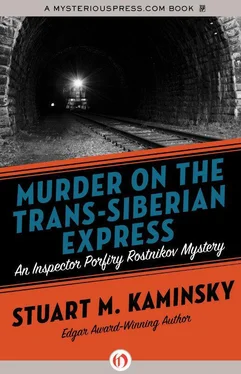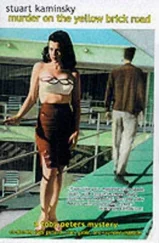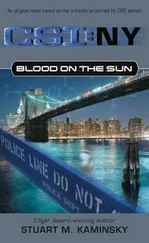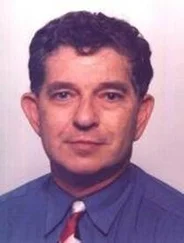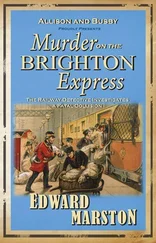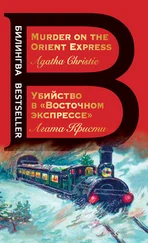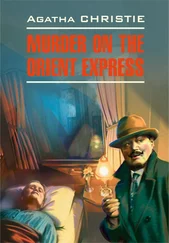Stuart Kaminsky - Murder on the Trans-Siberian Express
Здесь есть возможность читать онлайн «Stuart Kaminsky - Murder on the Trans-Siberian Express» весь текст электронной книги совершенно бесплатно (целиком полную версию без сокращений). В некоторых случаях можно слушать аудио, скачать через торрент в формате fb2 и присутствует краткое содержание. Год выпуска: 2012, Жанр: Полицейский детектив, на английском языке. Описание произведения, (предисловие) а так же отзывы посетителей доступны на портале библиотеки ЛибКат.
- Название:Murder on the Trans-Siberian Express
- Автор:
- Жанр:
- Год:2012
- ISBN:нет данных
- Рейтинг книги:3 / 5. Голосов: 1
-
Избранное:Добавить в избранное
- Отзывы:
-
Ваша оценка:
- 60
- 1
- 2
- 3
- 4
- 5
Murder on the Trans-Siberian Express: краткое содержание, описание и аннотация
Предлагаем к чтению аннотацию, описание, краткое содержание или предисловие (зависит от того, что написал сам автор книги «Murder on the Trans-Siberian Express»). Если вы не нашли необходимую информацию о книге — напишите в комментариях, мы постараемся отыскать её.
Murder on the Trans-Siberian Express — читать онлайн бесплатно полную книгу (весь текст) целиком
Ниже представлен текст книги, разбитый по страницам. Система сохранения места последней прочитанной страницы, позволяет с удобством читать онлайн бесплатно книгу «Murder on the Trans-Siberian Express», без необходимости каждый раз заново искать на чём Вы остановились. Поставьте закладку, и сможете в любой момент перейти на страницу, на которой закончили чтение.
Интервал:
Закладка:
Sasha said nothing as the waiter approached and poured a cup of coffee. Sasha ordered yoghurt, black bread, and an orange.
“We have entered an unholy alliance with Miss Britchevna,” said Rostnikov. “She has told me where the transfer will take place and the name of the man we are seeking, but there are complications.”
Rostnikov explained the situation. Svetlana Britchevna listened, drank coffee, and added nothing.
“And so,” said Rostnikov. “We have several hours. All we need do is watch our Pavel Cherkasov, be alert for the assassin, and step forward at the moment of interception.”
“That is all,” said Sasha with a sigh, indicating that the task promised to be far from easy.
“You and Svetlana … may I use your first name?” Rostnikov asked.
“You both may,” she said, looking from one man to the other.
“You will jointly watch our Pavel every moment from the time we leave this table. Find him and watch him.”
“We can play the role of lovers,” the woman said. “Since I know I cannot corrupt you, you will have to be a good actor. Are you a good actor, Sasha Tkach?”
In spite of what he knew about the woman, Sasha was stirred. Her eyes met his. She made it clear with a smile that she recognized the ripple of desire she was causing. Svetlana Britchevna was pleased. She had perhaps six or seven more years, perhaps more if she were fortunate and took care of herself, to have this effect on men, an effect that could be turned and tuned to her ambition. And her ambition was considerable. She intended to become the highest-ranking female member of the ministry. If she did not move too quickly and used the skills of men like Rostnikov, she might even rise to the very top. She did not say this aloud to anyone. There was no point to it and no one close enough to her with whom she wished to share her ambition. Besides, she would have been considered seriously deluded for believing that she could penetrate the all-male power structure.
“I have played many roles,” Sasha said as his black bread and yoghurt were brought to the table.
“Settled,” said Rostnikov. “I have some news for you, Sasha. Svetlana has allowed me to use her little cell phone to call Moscow. Anna Timofeyeva has checked on Matvei Labroadovnik.”
“How is he involved?” Svetlana asked.
“In our enterprise? Not at all. In Sasha’s life, monumentally. The man is, indeed, an artist of some secondary repute. He is, indeed, working in Istra on the Cathedral of the Resurrection.”
Sasha wanted to feel relieved. The prospect of his mother actually removing her shadow from his family promised a new start for Sasha and Maya, but he could tell from Porfiry Petrovich’s voice that there was more coming. And it came.
“Matvei Labroadovnik has won awards,” Rostnikov said. “He has had some government and private commissions, but, according to Anna Timofeyeva, he is now considered somewhat of a relic, a hopelessly old-fashioned artist whose time has long come and gone, been revived, faltered. This is Anna Timofeyeva’s conclusion. She has also concluded with certainty through confidential sources that Matvei Labroadovnik is down to his last few thousand rubles and has already spent the advance he received for his work on the cathedral.”
Sasha nodded. He felt an odd mixture of vindication and disappointment.
“Thank you,” he said. “I will address this when we return to Moscow.”
“My guess; Sasha,” Rostnikov said, reaching down to scratch just above his left knee, “is that Matvei may already have told Lydia that he is without money. If he is reasonably clever, he would realize that she might have resources for finding out his financial status.
“Then there would be nothing I could do,” said Sasha.
“You could consider that he is sincere,” said Rostnikov. “You could wait and see what develops. You could pay him a friendly visit. You could make plans for attending your mother’s wedding, should it prove inevitable.”
“If he is seeking my mother’s money,” said Sasha, “he will learn that there is a steep price to pay for it.”
“You could break his fingers,” the woman said with interest. “He is an artist.”
“No,” said Sasha, “the price he would pay would be in having to live with my mother. She is no fool. She will not part with a single ruble easily unless it is for me or my family, and when she does, there is always an unspoken demand for respect and compliance. The artist will pay dearly and probably wind up with very little for his efforts.”
“I agree,” said Rostnikov. “A question.”
Svetlana and Sasha looked at him.
“If all the oil in the world comes from fossil fuels, there must have been billions of dinosaurs. And those dinosaurs must have died suddenly and been buried instantly. If they died naturally or from predators, there would have been nothing remaining except bones, nothing to turn to oil. Out that window.”
Rostnikov looked out at a vast plain of small trees.
“Out that window thousands of dinosaurs must have roamed, fought for food, grown enormous. Either the oil we have does not come from fossils, the oil out there below this very ground, or some cataclysm engulfed the earth. What happened?”
Neither Svetlana nor Sasha answered. She was thinking about Pavel Cherkasov. He was thinking about his mother.
“The sun,” said Rostnikov. “The source of life. Something happened to the sun. It ceased to burn or something came between it and the earth. Something sudden.”
Svetlana wondered for an instant if Rostnikov might be just a bit mad. Sasha had heard such musings on a variety of subjects many times before. He knew Porfiry Petrovich Rostnikov was a man with unfathomable imagination.
“It could happen again,” said Rostnikov. “In the next few seconds. That which we think is important, whatever it might be, would be meaningless. Life would have to begin again. Perhaps the cockroaches would not even survive this time.”
“Perhaps,” said Sasha, glancing at the woman, whose eyes were fixed upon him.
“It is sometimes good to remember that the things we believe are important have little ultimate meaning,” said Rostnikov.
“One might be depressed,” said Svetlana.
“One might,” Rostnikov agreed. “But one might also be relieved. Like the Hindus we are free, if we choose, of earthly connection. There is the immediate moment, the likely short-term present, and the distant possible future. And in the immediate moment, it would be a good idea to find Pavel Cherkasov.”
Sasha had finished his breakfast. Svetlana Britchevna rose. So did he. They left Rostnikov sitting at the table.
At the end of the car she turned to Sasha and said, “Does he often talk like that?”
“Often,” he said.
She took his hand. He considered pulling away but did not.
“We are lovers, remember,” she said, turning her face to his.
Sasha would find it difficult to forget.
Pavel Cherkasov was awake and dressed. He had several jokes he wanted to try out on whoever might be fortunate enough to be seated with him for breakfast.
Pavel had a well-honed sense of imagined smell. He considered food first as a remembered savory odor, followed by recalled taste. Confirmation came in seeing the food, and taste was an ecstasy that surpassed sex.
He was alone. The old Americans and the one-legged Russian were gone. The old men, Pavel knew, needed little sleep at night and many naps during the day. Perhaps they had all gone to lunch early and saved him a seat at their table. He would listen patiently to their stories of a war long past, eat modestly in anticipation of a very important day, and try out his jokes. He had retrieved his suitcase and would keep it at his side until the moment came to exchange it for the smaller package on the railway platform. He would explain, if anyone asked, that he carried the duffel bag because he had papers inside it he would be needing, that he would be spending much of the day working. They would not question him. The bag was not large. The bills were packed tightly. People, Pavel knew, displayed little curiosity about such things.
Читать дальшеИнтервал:
Закладка:
Похожие книги на «Murder on the Trans-Siberian Express»
Представляем Вашему вниманию похожие книги на «Murder on the Trans-Siberian Express» списком для выбора. Мы отобрали схожую по названию и смыслу литературу в надежде предоставить читателям больше вариантов отыскать новые, интересные, ещё непрочитанные произведения.
Обсуждение, отзывы о книге «Murder on the Trans-Siberian Express» и просто собственные мнения читателей. Оставьте ваши комментарии, напишите, что Вы думаете о произведении, его смысле или главных героях. Укажите что конкретно понравилось, а что нет, и почему Вы так считаете.
